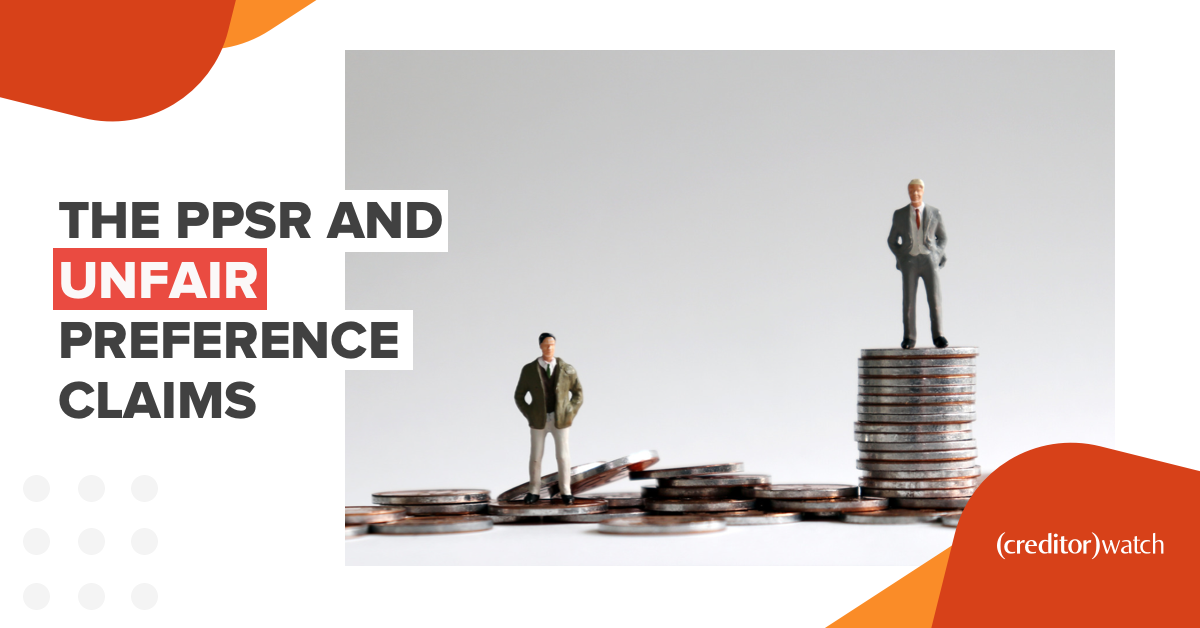How to keep your money in your pocket
Sometimes, when a customer is wound up, the priority isn’t to get assets back, but to retain payments already received. Did you know that, in certain circumstances, liquidators can demand that you return money that has already been paid?
Many business owners are confused about preferential payment claims, the liquidator’s rights, how to protect themselves, and the full capacity of the PPSR.
I aim to clear up this confusion by explaining how unfair preference claims work, the hidden dangers of accepting partial payments, and how the PPSR protects your business from preferential payment clawback.
What is preferential payment clawback?
If your customer enters liquidation, their liquidator can file an unfair preference claim. This allows them to conduct a preferential payment clawback. This means they take back money that has already been paid to you, to redistribute to other creditors, prioritising secured creditors.
Shockingly, many businesses aren’t aware of this, and it’s often too late by the time they find out.
Who is at risk of preferential payment clawback?
Businesses that accept partial payments are especially susceptible to preferential payment clawbacks. While it’s common to offer payment plans or let customers pay in instalments, there are hidden dangers to this.
Hilbert Klaster, one of our Senior Business Development Managers, explains, “Businesses that agree to partial payment terms are aware of their customers’ cash flow problems yet continue to trade. This makes them a prime target for liquidators to clawback money if their customer winds up.”
Four elements of unfair preference claims
A preferential payment has been made if:
- The transaction resulted in the creditor receiving more than it would have if the transaction were set aside.
- The debt was unsecured.
- The transaction between the creditor and company occurred within a period of six months before the company went into liquidation.
- The company was insolvent at the time of transaction or became insolvent as a result of entering into the transaction.
Section 588FA of the Corporations Act 2001 states that an “unfair preference” may be deemed a “voidable transaction”, allowing the liquidator to clawback funds.
How to protect your business from preferential payment claims
Registering on the PPSR the best defence to protect you from liquidators from making an unfair preference claim.
With a valid registration, you become a secured creditor, therefore the administrator cannot claim the debt was unsecured. As such you are protected from clawback.
Hilbert believes this is the greatest benefit of the PPSR:
“When a liquidator is appointed, there often isn’t any equity left in the business, so being a secured creditor doesn’t always guarantee a return. In such cases, creditors are more focused on retaining the money that’s been paid to them in the 6 months prior to their debtor’s liquidation. I know a construction company that recently lost $400k from a completely unexpected clawback. The PPSR can be lifesaving, especially for businesses with high-dollar value invoices.”
If you’d like to find out more about how the PPSR can protect your business, check out our comprehensive guide or get in touch with me at paul.mead@creditorwatch.com.au.
Protect your business with the PPSR
 Paul Mead
Paul Mead
Senior PPSR Consultant
With over fifteen years’ experience in financial services, and over seven years’ experience with the Personal Property Securities Register (PPSR), Paul has an abundance of knowledge assisting clients to mitigate their credit risk and minimise the risk of potential losses from insolvent clients.
As the PPSR specialist at CreditorWatch, Paul works with a wide range of businesses from small independent companies through to the largest corporates in Australia, to assist them with their PPSR requirements and ensure their processes are correct and as efficient as possible.
Outside of work, Paul enjoys running, hiking, golf and spending time with his young family.
Connect with Paul on LinkedIn or email paul.mead@creditorwatch.com.au.




